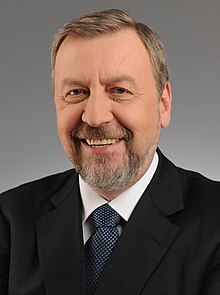Andrei Sannikov
| Andrei Sannikov | |
|---|---|
 |
|
| Born |
8 March 1954 Minsk, Belorussian SSR, Soviet Union |
| Residence | Minsk |
| Nationality | Belarusian |
| Known for | Activism |
| Spouse(s) | Iryna Khalip |
Andréi Olégovich Sánnikov (or Andrei Sannikau, Belarusian: Андрэй Алегавіч Саннікаў, Russian: Андрей Олегович Санников, born 8 March 1954) is a Belarusian politician and activist. In the early 1990s, he headed the Belarusian delegation on Nuclear and Conventional Weapons Armament Negotiations, also serving as the Belarusian diplomat to Switzerland. From 1995 to 1996, he served as Deputy Foreign Minister of Belarus, resigning as a form of political protest. He co-founded the civil action Charter 97, and was awarded the Bruno Kreisky Prize in 2005.
Sannikov was a candidate at the 2010 presidential election in Belarus, and had the second highest percentage of the popular votes after incumbent Alexander Lukashenko. He was incarcerated in a Minsk KGB facility for peacefully protesting at a demonstration after the elections, and faced up to a 15-year imprisonment.Amnesty International labeled him a prisoner of conscience and called for his immediate release on the grounds that he may be facing torture and medical neglect while in custody. On 14 May 2011, he was sentenced to five years' imprisonment on charges of organizing mass disturbances. According to his wife, noted journalist Iryna Khalip, as of September 2011 Sannikov was in grave danger of murder and injury while incarcerated, and was being pressured by authorities to leave politics. He was released and pardoned by Lukashenko on 14 April 2012.
Andrei Sannikov was born on 8 March 1954 in the city of Minsk. His father was a well-known Belarusian art researcher while his mother was a teacher of the Russian language. His grandfather Konstantin Sannikov was a well-known actor and film director in the Byelorussian SSR, one of founders of the Janka Kupala National Theatre, and a teacher at the Belarusian Theater and Art Institute in Moscow. Sannikov first attended school #42 as a boy, and in 1977 he graduated from Minsk State Linguistic University. He is fluent in his native Belarusian, Russian, English, and French.
...
Wikipedia
